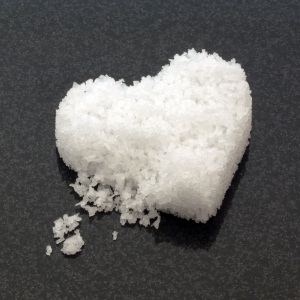
Over the past two weeks we have been discussing electrolytes (sodium, potassium, magnesium, calcium, chloride, bicarbonate and phosphate) and the water balance of the human body – all of which are all vitally important to our health.
Last week we concentrated on sodium, which is currently in the spotlight because of educational campaigns and anti-salt legislation. This is because eating too much salt (sodium) is linked to high blood pressure (hypertension), which is reaching epidemic levels among the South African population.
Read: South Africans consume too much salt
However, as with so many foods and nutrients, it is important to keep in mind that although excessive intakes are bad for us, or even fatal, small quantities are often essential to sustain life. This also applies to sodium.
Too little sodium
The first of our three articles about sodium emphasised that sodium is an essential electrolyte that plays a vitally important role in our health and well-being. What worries me is that there are, as always, purists who will throw the baby out with the bathwater and refuse to let a single grain of salt pass their lips.
Read: Low sodium trend growing
This kind of draconian behaviour is extreme, but not that unusual. When taken to the extreme, food avoidance in order to eat only foods regarded as “pure”, is classified as an eating disorder called “orthorexia”.
Low sodium a danger to the heart?
Excess sodium is detrimental to blood pressure, causing strokes and triggering heart failure, but too little salt may also be harmful, a new study has shown.
A team of researchers at the Population Research Institute, McMasters University, Hamilton, Ontario, Canada, lead by Dr O’Donnell, published the results of a very large study to determine how much sodium and potassium people excrete in their urine (i.e. reflecting how much salt they eat), and how this affects their cardiovascular health and overall mortality).
The researchers confirmed that high salt intakes above 6g per day which produced high sodium levels in the urine of the sample population (101 945 subjects in 17 countries over a follow-up period of nearly 4 years), were associated with an increased risk of hypertension and stroke.
Read: Treat hypertension to prevent stroke
However, in those subjects who ate less than 3g of salt per day, the risk of death due to major cardiovascular events such as heart attacks increased sharply again. These results have led the researchers to conclude that “an estimated sodium intake between 3 and 6g per day was associated with a lower risk of death and cardiovascular events than either a higher or lower estimated level of intake.” (O’Donnell et al, 2014)
What this means is that our bodies work best with sodium in the range between 3 and 6g a day. Go too high and you risk ill health and death, go too low and you are once again in danger.
In an earlier publication the team lead by O’Donnell (2013) already pointed out that no population guidelines in any country specify a safe lower level of sodium intake “based on the assumption that there is no unsafe lower limit”. Their latest study results published in 2014 indicate otherwise.
Will governments react?
These research findings support a report issued by the Institute of Medicine in the USA, warning that the American diet recommendation that sodium intake should be reduced to 1,5 g (1 500 mg) per day, was not adequately supported by scientific evidence (Bloomberg, 2014).
But Dr Elliott Antman, a leading cardiologist and recently appointed president of the American Heart Association immediately refuted the O’Donnell study findings, emphasising that he and his organisation were not convinced that sodium intake at low levels has a positive effect on health. (Bloomberg, 2014)
Read: How much sodium you need
So, there is a good chance that the American government will continue to lower its salt recommendations, possibly to levels that may prove harmful. And where the USA leads, others tend to follow.
What about iodine?
Most people in South Africa may know that our table salt is iodated to prevent thyroid problems in adults and cretinism in infants. The iodine fortification programme was one of the first attempts in South Africa to add a nutrient (iodine) to a basic commodity (table salt) for the purpose of eradicating a public health problem (hypothyroidism and cretinism).
In general, the iodation campaign can be regarded as a success, as goitre, iodine deficiency and infant cretinism have all been drastically reduced in this country.
Read: What iodine does for you
Hopefully salt restriction legislation will not prove counterproductive, i.e. by solving one crisis (hypertension) reintroduce a prior one (iodine deficiency).
Conclusions
I suspect that for the majority of South Africans who overindulge in salty foods, the legislation aimed at reducing our sodium or salt intake will have a positive effect on health. If, however, you have a tendency to be fanatical about foods you regard as “bad” to the point of total exclusion, please keep in mind that you do need some sodium (probably between 3 to 6g per day) to maintain your electrolyte and body water balances.
If you live in an iodine deficient area, then discuss how much table salt you should be using with your doctor, and if you cut your salt intake drastically, remember to use an iodine supplement, but only as prescribed by your doctor.
Read more:
Salt: the slow, silent killer
Govt consulting on salt content
Salt intake linked to obesity
References:
- Bloomberg (2014). Seasoning the salt debate. The Times. Published on 15 August 2014, p 9;
- O’Donnell, MJ et al. (2013). Salt intake and cardiovascular disease: why are the data inconsistent? European Heart Journal, 34(14): 1034-1040;
- O’Donnell, MJ et al. (2014). Urinary sodium and potassium excretion, mortality, and cardiovascular events. New England Medical Journal, 371(7):612-23.




 Publications
Publications
 Partners
Partners










